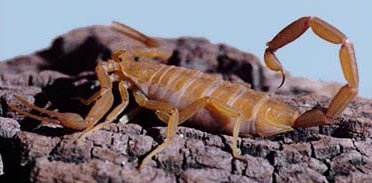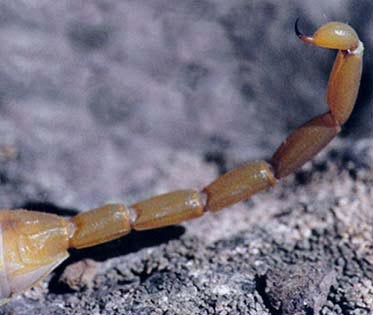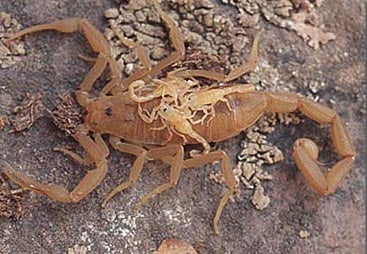Not Insects

Scorpions are of the class Arachnida and are considered relatives of spiders and ticks. As arachnids, scorpions have mouthparts called chelicerae (jaws), a pair of pedipalps (pinchers), and four pairs of legs.
Scorpion Stinger

The stinger is called a telson. The bulb part of the telson, called the vesicle, contains a pair of glandular sacs that produce and store the components of the venom. The needle part of the telson is called the aculeus. It is similar to a hypodermic needle. Each venom sac is connected to the openings of the venom duct on the aculeus. The venom sacs are controlled voluntarily, so the scorpion can regulate how much venom is injected.
Scorpion Babies

A scorpion can have as many as 100 babies in a single brood. They are born alive, not hatched from eggs like insects. When they are born, baby scorpions have a very soft outside shell, or exoskeleton. They crawl up onto their mother's back and ride there for 10 to 20 days until their exoskeleton gets stiff and hard. Then they crawl off and begin life on their own.
Sometimes when the mother scorpion cannot find enough insects, bugs, or grub worms to eat, she will eat her own babies. Luckily this is only a last resort. Usually, the mother scorpion will eat her babies only to survive.
Credits: Photos by Barb Backes
Read more about: Not So Scary Scorpions
Bibliographic details:
- Article: Scorpion Facts
- Author(s): Dr. Biology
- Publisher: Arizona State University School of Life Sciences Ask A Biologist
- Site name: ASU - Ask A Biologist
- Date published:
- Date accessed:
- Link: https://askabiologist.asu.edu/scorpion-facts
APA Style
Dr. Biology. (). Scorpion Facts. ASU - Ask A Biologist. Retrieved from https://askabiologist.asu.edu/scorpion-facts
Chicago Manual of Style
Dr. Biology. "Scorpion Facts". ASU - Ask A Biologist. . https://askabiologist.asu.edu/scorpion-facts
Dr. Biology. "Scorpion Facts". ASU - Ask A Biologist. . ASU - Ask A Biologist, Web. https://askabiologist.asu.edu/scorpion-facts
MLA 2017 Style

Be Part of
Ask A Biologist
By volunteering, or simply sending us feedback on the site. Scientists, teachers, writers, illustrators, and translators are all important to the program. If you are interested in helping with the website we have a Volunteers page to get the process started.

